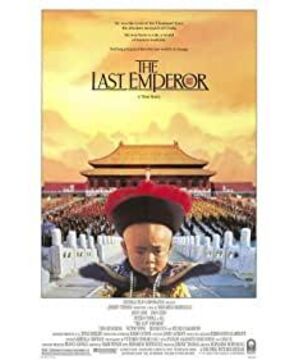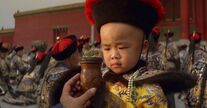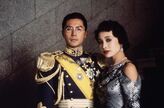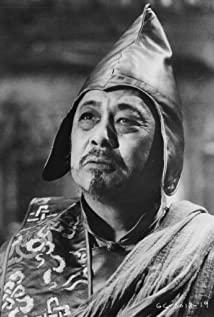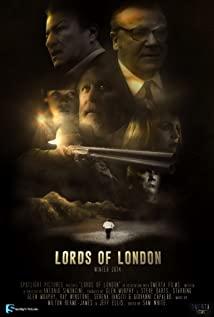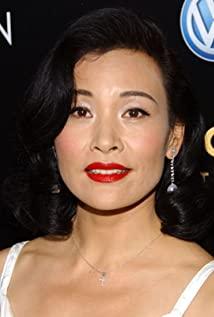——On the way of characterizing and constructing characters in the film "The Last Emperor"
Wen / Gu Yixin
"The Last Emperor" (The Last Emperor) tells the fate and friendship between a person and his own identity. The film has always been well-known for its delicacy and prudence in technical style, but it is a moderate intermediate type in ideology. As the first feature film director allowed to enter the Forbidden City to shoot, Bertolucci is relatively far away from the choice of historical standpoint. It takes the fate and emotion of the individual as the core of the film's narrative.
Aixinjueluo Puyi (1906—1967), the last emperor of the Qing Dynasty, was named Xuantong. In 1931, he became the emperor of the Puppet Manchukuo under the Japanese plan. After the end of World War II, he was imprisoned by the Soviet Union as a war criminal of Manchukuo. In 1950, he was transferred to the Chinese government. In 1959, he received an amnesty. In 1967, he died of uremia in Beijing.
This is the chronology of the life of Emperor Xuantong. As a 218-minute huge production, "The Last Emperor" spans half a century in time and involves almost all major events in Puyi's life. At the same time, the film also poetically explores the hidden places of history. Fundamentally speaking, "The Last Emperor" tells not only the history of an emperor, but also the story of a "man as an emperor"-it is about the history and fiction of dual identities.
The film starts flashbacks from the prison in 1950. With the reveal of Puyi's identity, dream-like memories are slowly released from the cold reality. The Forbidden City in the memory is obviously treated with visual stylization. The warm colors and the texture of oil painting construct a pure land full of imaginative memories for the film. Lonely childhood, fascinating palace, growing passion and misunderstandings-the representation system composed of a series of visual and plot elements, while constructing a spectacle effect on a certain western cultural standpoint, it also creates for itself A rich and sensitive poetry.
Then, perhaps the question that should be considered is: Does this film construct a true image of Puyi? Is it true to history in the universal sense? From the perspective of film aesthetics, I think this is not the problem. The great attraction of "The Last Emperor" is that it captures the source of an inexhaustible narrative, that is, an imagination that has nothing to do with authenticity. More importantly, the film raises some interesting questions: whether the individual written by history is real; whether it misses the unknown fragments that contain the truth. In other words, how does an individual in a truly complete sense exist in the entire history?
Here I would like to borrow a formulation of Milan Kundera: people as individuals can often be constructed and understood separately from the perspectives of "uppercase" and "lowercase". From the perspective of capitalization, the meaning of man depends on a certain historical value and purpose; from the perspective of lowercase, there is a living person's most true and secret emotion in the private sphere. This duality of personality identity has outstanding appeal for screen and text audiences. As shown in the film, "The Last Emperor" uses a large number of visual and image representations to construct two overlapping images of Puyi, "uppercase" and "lowercase", and their foundations are "history" and "fiction" respectively. The discourse mechanism.
In Puyi's body, the meaning of the identity of the "last emperor" dominates everything and compulsorily becomes the foundation on which his entire life depends. This identity led to his childhood loneliness, peculiar marriage, life out of the times, and even his erratic political destiny. He is the object of observation and judgment from the outside world, and a symbol that represents a specific meaning in the monumental history. Especially at the end of the film, when Pu Yi, who has become an ordinary person, reappears in the Forbidden City, he is more like a living fossil and symbol of a sad history.
Corresponding to this capitalized self, how to construct Puyi's personal growth history is the most artistic part of "The Last Emperor". The boldest setting in this construction process is that he is conceived as a boy with Oedipus complex, which is concentratedly expressed as his attachment to the mother's substitute—the nurse. This attachment symbolizes the addiction of his childhood soul, and the pain of growth lies in: one day he will suddenly wake up from this state. In a crucial scene of the film, when he realized the collapse of his emperor status, his nurse was being sent away from him. At this moment, he not only lost his "butterfly", He also lost all his imagination of life, power and emotion in his childhood. Taking this scene as a turning point, we begin to truly realize the pain of a person's life growth, which forms a touching emotional force, as if revealing the huge tragedy hidden in this boy.
Bertolucci himself once said: "If I had no sympathy for Puyi, I would not make this film. I even like the hateful characters, I need to love all the characters in front of the camera. Even if they are bad, I I also tried to make them have a certain kind of tragic, thereby creating a sense of nobility. "I think the tragedy of Aixinjueluo Puyi lies in his inability to choose his own destiny. He may have played a failed historical role, but as a life individual, he is just a person who is unfortunately imprisoned by his own identity and destiny, and all his sense of loneliness and fatalism comes from this. As Puyi's teacher Johnston said in the film, "The emperor may be the loneliest boy in the world." The fiction of childhood vaguely reveals the cause of Pu Yi’s character in the film—because the beautiful illusion of childhood was crushed, he has been in a certain sense of loss of security throughout his life; in the final analysis, he is a strong self-esteem. Emotionally fragile lonely person.
At the end of the film, Pu Yi returned to the Forbidden City as an ordinary person and took out her childhood plaything (that was a cricket cage he got at the ceremony of ascension to the throne fifty years ago) from under the seat of the dragon chair, in red In the evening photos, a cricket crawled out of the cage-this picture shows an unparalleled sense of vitality, which is heart-pounding. It means the ambiguity of the meaning of time and the absence of the judge of history. . In the end, the film completes the construction of "people" in a fictitious way. As we have seen, the world of secret private emotions locks everything forever.
In any case, "The Last Emperor" provides us with a kind of conjecture that may prove to be effective-what the viewers of history see is always a theatrical illusion, and a "real" image is just through Constructed with fictitious representations. The film uses various representations to create an imaginary reality. The reason why this imaginary has a certain authenticity is precisely because its opposite—the capitalized, historic individual, is non-authentic. If a leap-forward comparison is made, this potential text structure in "The Last Emperor" is surprisingly consistent with "Citizen Kane" as the benchmark of film history: in this film, the symbolic world constituted by the image of childhood, The "Rosebud" that echoes the latter's end and end is exactly the same. They all mean the cost of growth and the loss of innocence, and they are the only things the protagonist can grasp and cherish after the vicissitudes of life. In the end, they all pointed out a certain truth that is easy to be ignored. Although the individual exists in the capital history, he still has a unique identity that other people cannot observe and understand. It is the uniqueness and inaccuracy of this identity. Give a person the most precious dignity of existence.
2009/7/4
View more about The Last Emperor reviews


